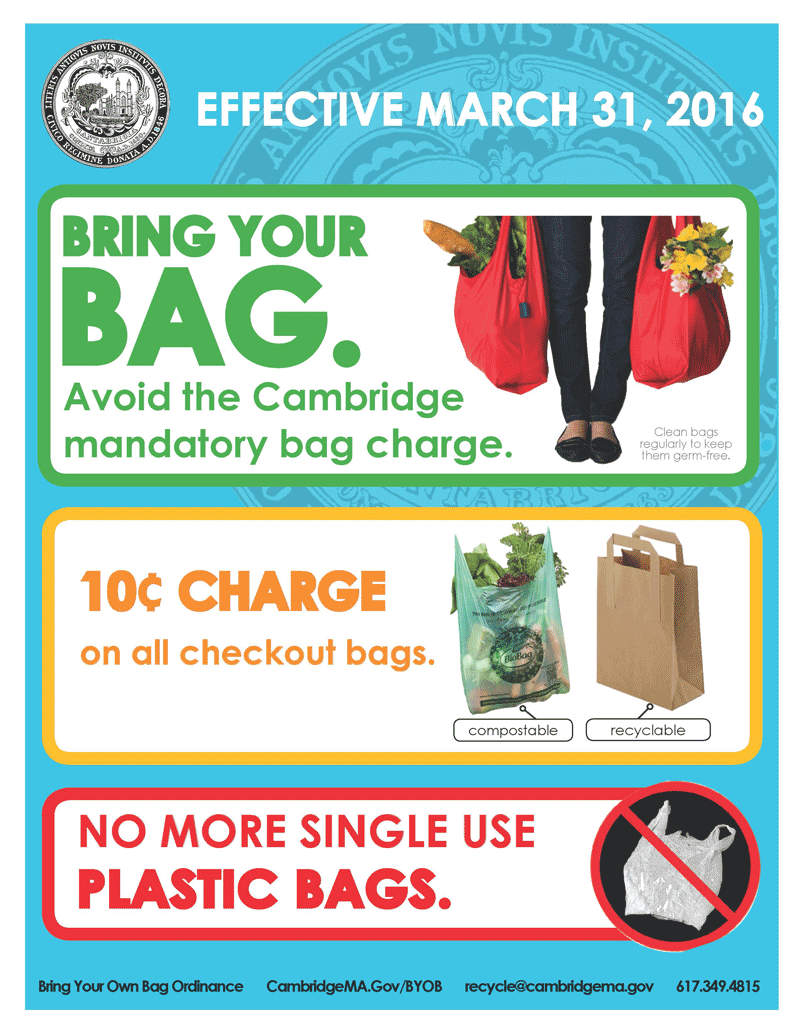
Cambridge InsideOut - February 9, 2016
5:30pm – Michael Orr, Waste Reduction Program Manager
6:00pm – News & Analysis

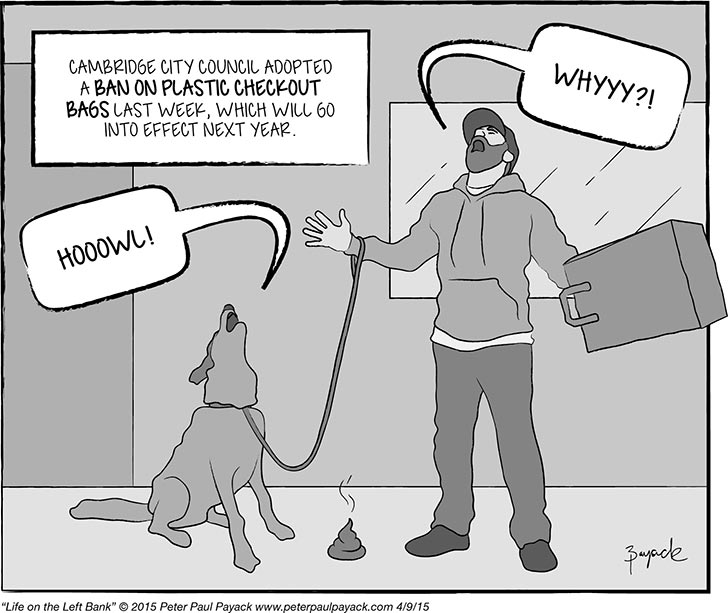
O-2 June 14, 2010
COUNCILLOR CHEUNG
WHEREAS: According to the EPA, Americans use 380 billion plastic bags each year, only 5% of which were recycled, with the rest landing in landfills, where it takes over 1,000 years for a plastic bag to decompose; and
WHEREAS: In 2008, the Seattle City Council approved a 20-cent fee for each disposable paper or plastic bag used at grocery, drug and convenience stores; and
WHEREAS: This year, the California State Assembly approved a measure banning single-use plastic and paper bags from being handed out at grocery, convenience, and other stores after San Francisco banned the use of plastic bags and ordered them to be replaced with more eco-friendly materials in 2008; and
WHEREAS: Last year, Washington DC imposed a tax of 5 cents per plastic bag for supermarket customers, the revenues of which are being used to combat local river pollution; since its implementation, the monthly average of 22.5 million plastic bags has dropped to just under 3 million in Washington DC; and
WHEREAS: The purpose of these fees and measures are not to add a financial burden to the city's shoppers, but to encourage shoppers to develop eco-friendly habits; and
WHEREAS: In a progressive community such as Cambridge, many residents have already made a conscious decision to frequent establishments that are green friendly; and
WHEREAS: Currently many of Cambridge's supermarkets have stopped using plastic bags already, including all three Whole Foods locations, and the Harvest Co-op, which offers a 5 cent per bag discount for people who bring their own bags; and
WHEREAS: With the environmental benefits being indisputable, the only remaining questions pertain to the economic impact on residents and businesses, and the desire to create a level playing field wherein local businesses are not economically disadvantaged for making community-minded decisions that promote sustainable consumerism; now therefore be it
ORDERED: That the City Manager be and is hereby requested to confer with the appropriate department heads on the feasibility of instituting a five cent per disposable bag fee, collected by the City that would in turn be put aside into a fund which purpose is to buy canvas bags wholesale and distribute them to Cambridge residents, and report back to the Economic Development Committee no later than Aug 1st, 2010, in time for planned hearing to discuss this proposed legislation with affected business owners.
Committee Report #3
The Environment Committee held a public meeting on Tues, Apr 26, 2011 at 5:42pm in the Sullivan Chamber.
The purpose of the meeting was to discuss the future of curbside collection of organic waste and decreasing the use of plastic bags.
Present at the meeting were Vice Mayor Henrietta Davis, Chair of the Committee; Councillor Denise Simmons; Deputy City Manager Richard Rossi; Commissioner of Public Works Lisa Peterson; Assistant Public Works Commissioner for Operations John Nardone; Recycling Director Randi Mail; Environmental Services Manager Public Works (PWD) John D. Fitzgerald; Penny Peters; and Deputy City Clerk Donna P. Lopez.
Also present were Judith Nathans, 511 Putnam Avenue; Helen Snively, 1 Fayette Park; Debby Gale, 93 Hammond Street; James Venter, 90 Wareham Street; Matt Nespoli, 460 Green Street # 8; Minka vanBeuzekom, 20 Essex Street; Catherine Cartor, 8 Jay Street; Steven Sloan and Erin Rowland, 127 Trowbridge Street; Elena Saporta, 102 Ellery Street; Jesse Gorden, Cambridge Energy Alliance; Molly Rothlisberger; Janneke House, Executive Director, Cambridge Local First.
Vice Mayor Davis convened the meeting and explained the purpose. These topics were referred to the Environment Committee by the City Council. At this time Recycling Director Randi Mail gave a presentation on the future of curbside collection of organic waste.
Ms. Mail reported that 3,000 tons per year would be removed from the waste stream if composting was utilized. There are now 70 businesses composting. The haulers are at capacity. MassDEP has recognized that processing capacity is a major barrier. The city processor is working collaboratively to build an organic recycling facility. Many residents bring buckets with food scraps to the Recycling Center. At the beginning of the program, 500 residents signed up but the DPW isn't tracking the number since then. There are three schools doing expanded recycling, including composting: King Open, Graham & Parks, and the 9th Grade at the Longfellow. A compost workshop was held for apartment buildings. Whole Foods at Prospect Street is taking food scraps from customers and are paying for the compost collection.
Vice Mayor Davis asked how long it would be before a facility is available to take food scraps. Commissioner Peterson responded that it would be two years at the earliest. No location has been cited. The goal is commercial food scraps. The residential stream is very different from large-scale collection. Ms. Mail commented that the state has resources for food donations. If food is set out to be served it cannot be donated.
Ms. Nathans spoke about a program "Rock and Wrap It Up" which deals with sports venues at rock concerts. She also spoke about the EPA guidelines for food donation and waste.
Vice Mayor Davis asked what the budgeting impact of composting is. Commissioner Peterson responded that the budget impact will not be known until a facility is permitted. Mr. Rossi added that the impact of food waste recycling would result in a budgetary decrease; it would also be good for the environment. This needs planning.
Matt Nespoli stated that he is waiting for a facility to come on-line. He suggested incentives to encourage composting. Commissioner Peterson commented that rubbish collection and single-stream recycling is free. The city provides incentives by issuing toters. Composting, however, is a different question. Separate toters are needed when collecting compost with yard waste to reduce rodent infestation. Mr. Nespoli asked if "pay as you throw" was discussed. Commissioner Peterson responded that the city discussed it many times in the 80s and 90s. There are a lot of benefits to "pay as you throw". However there are also a lot of challenges such as cost and implementation at multi-family dwellings. Ms. Nathans stated that "pay as you throw" is handled differently throughout the state.
Commissioner Peterson stated that 30,000 total tons of solid waste is collected with 13,000 tons recycled. Collection of solid waste this year is projected at 15 tons. Mr. Rossi informed the committee that the city only handles 1/3 of the total trash. Ms. Mail added that private handlers pick up the trash at multi-family and large residential dwellings, institutions, and commercial businesses.
Minka vanBeuzekom asked if commercial and large residential trash pick-up was separate from the numbers given. Commissioner Peterson stated that the 30,000 total tons includes commercial and residential trash pick-up but does not include private trash pick-up. Vice Mayor Davis stated that commercial recycling is not enforced; is this true? Commissioner Peterson responded in the affirmative due to finite resources. The License Commission has enacted that haulers must offer recycling. Conversations were held this week by Ms. Mail with the haulers on the barriers to recycling.
Minka vanBeuzekom asked about restaurant compost waste pick up. Ms. Mail stated that there are several ways services are measured for commercial organic waste pickup: weight, frequency, dumpster size. Metro Pedal Power is looking into pickup of food scraps by bicycle.
Steven Sloan stated that he uses the Whole Foods and the transfer station for composting. He did composting in his yard and had rats. He only has one bag of trash per month. He suggested getting help from the city on what bins to use and where to store it. He also suggested making
compost bins available to residents as well as other sites to collect compost other than Whole Foods. Vice Mayor Davis commented that 5 gallon galvanized cans are a good vessel. She spoke about having more publicity about the sites for compost collection.
Ms. Mail informed the committee that she spoke with Whole Foods about their Fresh Pond and River Street locations. Composting cannot be handled at the Fresh Pond or River Street locations. She is trying hard to get another location, but cost, maintenance, accessibility and responsibility are all issues. Mr. Nespoli suggested that Whole Foods should advertise this service.
At this time Vice Mayor Davis submitted the following motion:
RESOLVED: That the City Council go on record recognizing and thanking the Prospect Street Whole Foods for accepting food scraps for composting.
The motion - Carried.
At 6:18pm Vice Mayor Davis opened the meeting to discuss decreasing the use of plastic bags.
Commissioner Peterson stated that retailers were encouraged to take back plastic bags.
Ms. Mail spoke about San Francisco and their plastic bag reduction ordinance. San Francisco banned plastic bags. Only compostable bags can be used. San Francisco has curbside composting in place. Compost bins must be used with compostable bags. This is a good model for rodent control. Whole Foods sells compostable bags.
Penny Peters asked if small retailers are exempt from the ban in San Francisco. Ms. Mail responded that the San Francisco ordinance only applies to large chain stores. The Mass DEP and the Massachusetts Food Association have a memorandum of understanding to set a goal to reduce plastic bags by 25% by 2013. Whole Foods banned plastic bags three years ago. Trader Joes, CVS and Walgreens encourage the use of reusable bags. At the Harvest Coop 40% of its customers use reusable bags.
Vice Mayor Davis asked about reducing the use of plastic trash bags. Commissioner Peterson commented that the city encourages the use of barrels with lids and thicker plastic bags that are rodent resistant. The best practice is to have plastic bags in the barrels. Residential compliance is good. Mr. Nardone added that it is a learning curve to put the lid on the barrel. Vice Mayor Davis asked if the Commissioner wished that plastic bags were not used. There is a request that on private property that trash is in a plastic bag in a barrel with a lid responded Commissioner Peterson.
In response to a question as to where plastic bags are taken Ms. Mail informed the committee that plastic bags get stuck and cause equipment damage at the Casella Recycling Center. The DPW drop-off center accepts plastic bags. It takes 5-6 weeks to make a bale of plastic bags. Ms. Nathan also noted that dry cleaner bags are not accepted. Bubble wrap is also not accepted stated Ms. Mail. Ms. Nathans informed the committee that potato chip bags and frozen food bags are not recyclable. Whole Foods also accepts plastic bags
Vice Mayor Davis stated that Terracycle is undertaking a promotional opportunity to recycle a variety of products not currently recycled and using it as a fund raiser. At dog parks in other communities people bring bags and recycle them for the pick-up of dog waste. Commissioner Peterson stated that Public Works will try this in a park.
Vice Mayor Davis announced that May 14th is "Give Your Stuff Away Day." Commissioner Peterson stated that Public Works will accept the stuff it usually accepts. Public Works does not want large equipment and computers. The DPW encourages donations.
Catherine Cartor suggested a multi-yard sale. She stated that she spent a lot of time to find out who takes what. Ms. Mail informed Ms. Cartor that on the Public Works website is a link to outlets where donations are accepted. See "Get Rid Of It Right".
Vice Mayor Davis read into the record an e-mail received from Julie Wormser in favor of the mixed recycling bin. She supported continued curbside compost pickup (ATTACHMENT A).
Vice Mayor Davis thanked all those present for their attendance.
The meeting adjourned at 6:54pm.
For the Committee,
Vice Mayor Henrietta Davis, Chair
O-10 Jan 23, 2012 Amended
COUNCILLOR DECKER
COUNCILLOR VANBEUZEKOM
WHEREAS: It has come to the attention of this City Council that plastic bags are either restricted or banned in over a quarter of the world's countries. In the United States, bans have been imposed at the local level, starting with Nantucket over 20 years ago. San Francisco imposed a ban in 2007, later followed by Westport, Connecticut, Edmonds, Washington, Los Angeles County, CA, Brownsville, Texas; Bethel, Alaska, North Carolina's Outerbanks Region, Portland, Oregon; Seattle, Washington, San Jose, California, 30 rural villages in Alaska, and many cities throughout Canada. Countries that have banned or restricted them include: China, Israel, Belgium, Italy, Ireland, Hong Kong, Taiwan, Singapore, Botswana, Kenya, Tanzania, South Africa, Thailand, several states in India, three states and territories of Australia, Paris, Mexico City, Rajasthan (India), Sikkim (India), Taiwan, Singapore, Bangladesh, Malawi, Germany, Sweden, Paris, Mexico City, and three states/territories of Australia. These cities, states, and nations have had great success in curbing the use of disposable plastic bags from retailers; and
WHEREAS: Plastic bags contribute to litter and landfill loads and find their way into our waterways, parks, beaches, and streets. Many animals ingest plastic bags, mistaking them for food, and therefore die. Also, plastic bags are non-biodegradable. These bags don't decompose, they photodegrade, slowly breaking up into smaller and smaller toxic bits. This process takes about 200-400 years; and
WHEREAS: The United Nations estimates that plastic bags kill 1 billion animals per year. These animals suffer a painful death as the plastic wraps around their intestines or they choke to death; and
WHEREAS: In 2007 San Francisco became the first major city in the U.S. to ban single-use plastic bags in chain grocery stores and pharmacies. Dozens of other cities have followed suit and rising concern about the paltry recyclability of plastic bags has emphasized the benefit of such bans and the idea of reusable totes. It is estimated that close to 100 million fewer plastic bags were handed out over the last year in San Francisco; and
WHEREAS: The recycling of plastic bags is approximately 5.2%. Even if the recycling rate of plastic bags were to double - triple - or more, the remaining bags would still present an unacceptable danger to the world's wildlife; and
WHEREAS: The Council has requested that the City Manager look into the elimination of plastic bags from retail institutions in the community; now therefore be it
ORDERED: That the City Manager be and hereby is requested to revisit instituting a ban similar to that of the cities mentioned above and to revisit the issue of coordination with surrounding communities; and be it further
ORDERED: That the City Manager be and hereby is requested to report back to the City Council on this matter.
O-5 Mar 5, 2012
COUNCILLOR VANBEUZEKOM
WHEREAS: On Jan 23, 2012 the City Council submitted Policy Order O-10, an order requesting that the City Manager look into the elimination of plastic bags from retail institutions in the Cambridge community; and
WHEREAS: In response to this order, a letter was sent to the City Council and the City Manager from the Massachusetts Food Association, a trade organization representing the Commonwealth's grocery/retailer industry, which states it is opposed to the proposed banning of plastic bag usage by Cambridge retailers; and
WHEREAS: The City Manager has responded to said letter; now therefore be it
ORDERED: That the City Manager be and hereby is requested to provide the City Council the response to Massachusetts Food Association's letter.
March 30, 2015 Unfinished Business #11. A communication was received from Donna P. Lopez, City Clerk, transmitting a report from Councillor David P. Maher, Chair of the Ordinance Committee for a public hearing held on Dec 19, 2013 to conduct a public hearing on an amendment to the Municipal Code in Chapter 8.67 entitled relating to Plastic Bag Reduction. The question comes on passing to be ordained on or after Feb 24, 2014.
Ordained 8-1 (Toomey voted NO) - Ordinance #1366
Bring Your Own Bag Ordinance (PDF)
|
|
BYOB Ordinance FAQs:
1. Abbreviated definitions of bags. For full definition, visit the website:
a. Reusable bag—a bag with handles for multiple reuse and, if plastic at least 3.0 mils thickness.
b. Recyclable Paper Bag—100% recyclable and contains at least 40% post-consumer recycled content. The bag must display both. If your bag doesn’t display both, please contact Michael Orr at Cambridge DPW.
c. Compostable Bag—must be BPI certified.
2. Question: Is the checkout bag charge taxable?
Answer: Yes, the checkout bag charge is subject to sales tax. If you need help understanding sales tax collection and reporting, consider attending the Accounting/Sales Tax Office Hours on February 23, 2016.
3. Question: What’s the plan for informing customers of the ordinance?
Answer: The City is doing outreach via social media, news outlets, and billboards in Cambridge. But, a lot of the outreach must be done in retail establishments. To assist with that, we provided checkout stickers and flyers. Cashiers should ask: “Did you bring a reusable bag, or would you like a bag for 10¢ each plus tax?” This is a best practice in other cities with bag ordinances. The statement will remind customers to bring reusable bags and avoid any confusion about the cost of bags.
4. Question: May we offer a discount to customers bringing their own reusable bag?
Answer: Yes! In fact, we strongly encourage this to further incentivize waste reduction.
5. Question: What if my paper bag doesn’t have handles?
Answer: The spirit of the law is to help change the consumption habits of consumers. Therefore, we strongly encourage retailers to ask customers if they absolutely need a bag regardless of whether the bag falls under the ordinance or not. If there aren’t handles the bag does not fall under the ordinance.
6. Question: I own a restaurant/food establishment; does this ordinance apply to me?
Answer: Yes, if your business provides bags with handles at checkout. If a restaurant provides a bag with handles for take-out, delivery, or food to-go from an in-house meal there must be a charge for the bag.
7. Question: What if my paper bags don’t display the proper information?
Answer: Contact your supplier to ask for “legislatively compliant bags.” Be sure the correct information is displayed on the bag. If you are unable to get bags that display the correct info, please contact DPW.
8. Question: What if there is no reasonable alternative to the bags I provide currently?
Answer: You may apply for an exemption, which is available online.
https://docs.google.com/forms/d/1VHSU94BZvpmtgeLOAClhQIVU-HXOihL8OqRCb9GL9c8/viewform
https://docs.google.com/forms/d/1Wyl0vt1U5_ZWI06Idkcf0xwqi4Fbkc9exEljM4MriSw/viewform
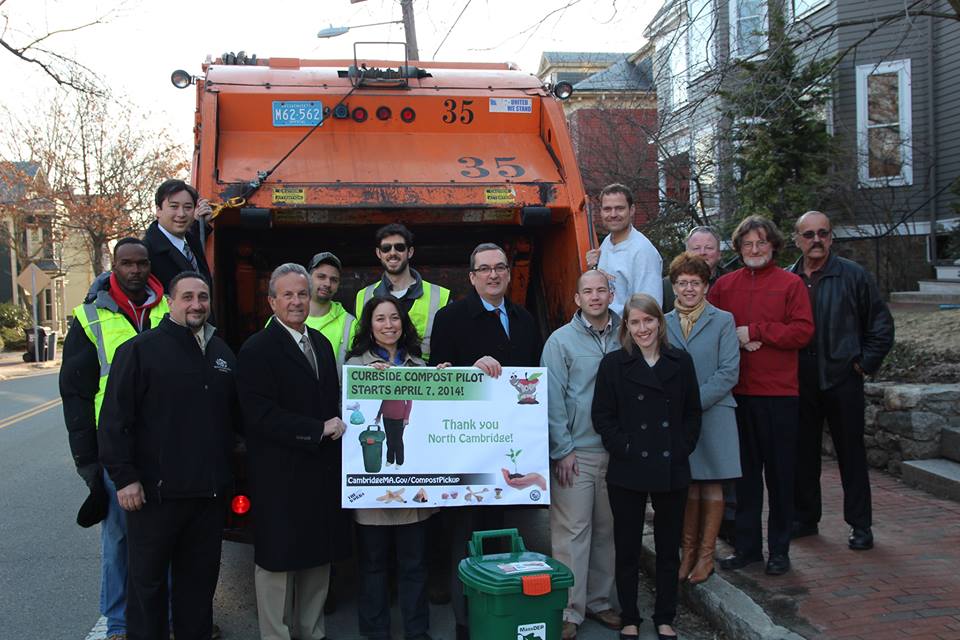
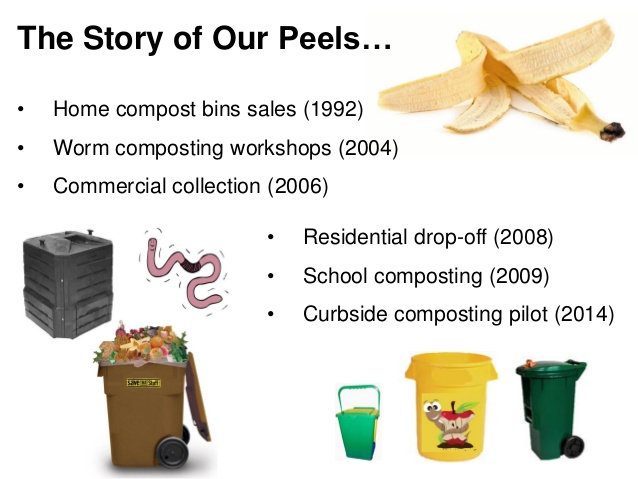
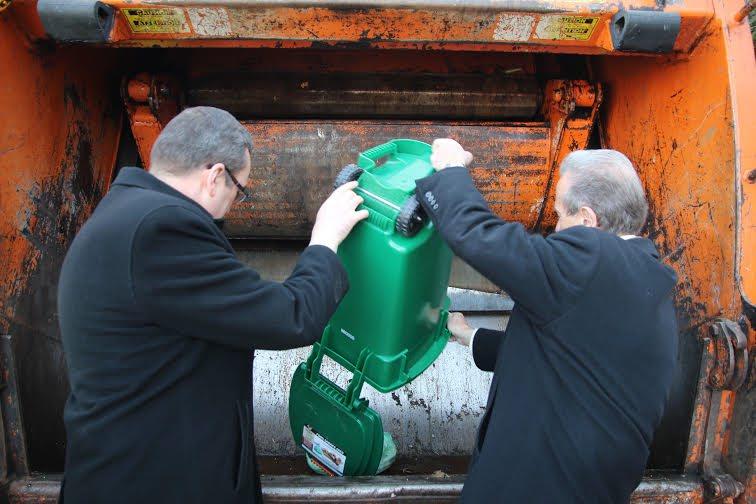
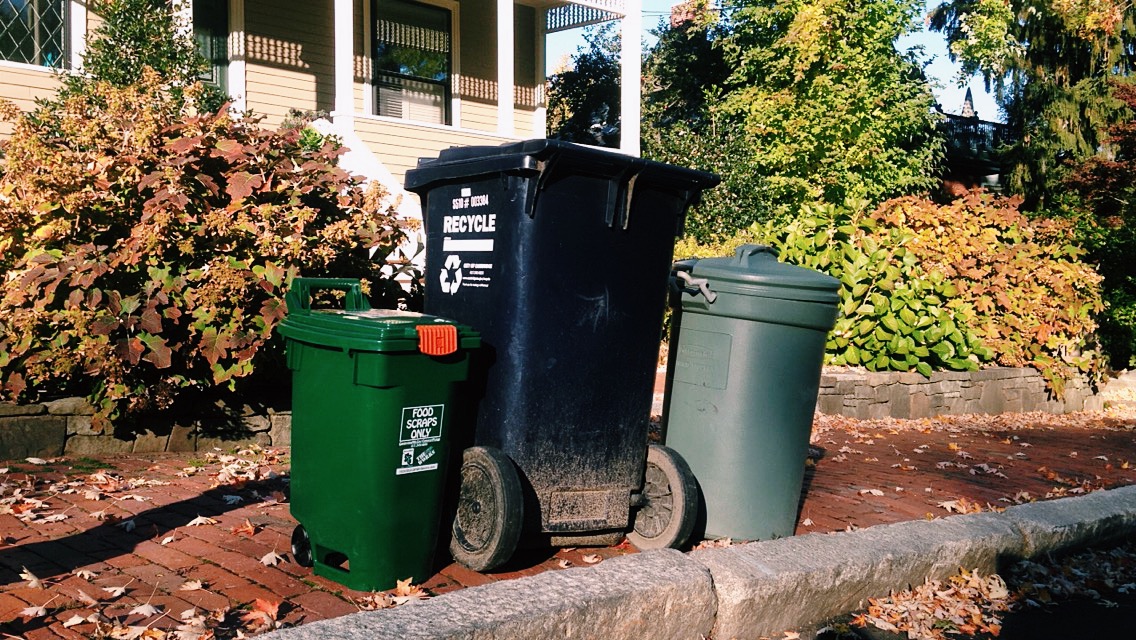
Announcements:
Manager's Agenda #17. A communication transmitted from Richard C. Rossi, City Manager, relative to the appointment of Sharlene Yang as the new STEAM Coordinator.
Applications & Petitions #1. A zoning petition has been received from Sage Cannabis, Inc., to amend the provisions of the Medical Marijuana Overlay District Section 20.700 of the Cambridge Zoning Ordinance and Map.
Communications #8. A communication was received from Michael Dundas, Chief Executive Officer, Sage Cannabis, Inc., 13 Commercial Way, Milford, MA, regarding a status update on the zoning amendment petition APP 2015 #72 filed with the Cambridge City Clerk on Nov 9, 2015.
Order #3. That the zoning petition filed by Milford Medicinals, Inc. be placed on file. Mayor Simmons
Order #5. That the amendment to the Zoning Ordinances of the City of Cambridge to amend the provisions of the PUD-KS District set forth in Section 13.10 of the Zoning Ordinances and which includes a majority of the Volpe Transportation Systems Center site, be refiled as of Feb 9, 2015. Councillor Carlone
Order #6. That the City Manager is requested to confer with the Community Development Department and other relevant City departments to study the benefits of a wellbeing index and plan for how it might be incorporated into various City planning processes, including the city wide Master Plan. Councillor Carlone, Vice Mayor McGovern